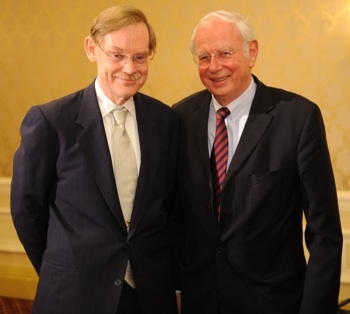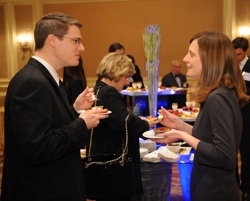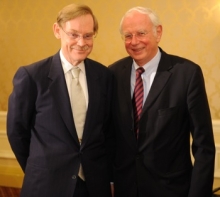
World Bank President Robert Zoellick (left) and German Ambassador Klaus Scharioth

Brendan McGarry (2004), Anke Wienand (1988), and Amanda Bensen (2007)
Washington, DC - The Honorable Robert Zoellick, president of the World Bank and former trustee of the Arthur F. Burns Fellowship, recently spoke about the state of the world economy to alumni, trustees and friends of the fellowship. The Goldman Sachs Group hosted the sixth annual alumni dinner at the Ritz Carlton Hotel in Washington, DC, on Feb. 19.

World Bank President Robert Zoellick (left) and German Ambassador Klaus Scharioth
"The global financial meltdown is clearly the most important story of the day, and Burns alumni got a deep insight from Zoellick on how the World Bank is coping with the crisis," said ICFJ president and Burns trustee Joyce Barnathan.
Zoellick explained that in order to understand the state of the U.S. economy, we must look at it in context and consider the broader global implications, even suggesting a future cooperation with China.
Among the approximately 100 distinguished guests, between 30 and 40 were alumni. In addition, ten alumni worldwide followed the evening's activity through the first-ever live video stream.

World Bank President Robert Zoellick (left) and German Ambassador Klaus Scharioth
Burns alumni will also gather for the German alumni dinner in Berlin on Thursday, June 4. Dr. Josef Ackermann, CEO of Deutsche Bank AG, will be the keynote speaker.